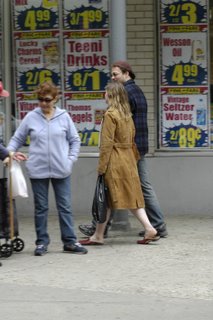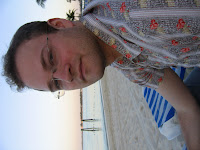
New York is known as a "walking city." The majority of residents don't have cars and most people would scoff at taking the subway only one or two stops. Why ride when you can walk?
But British writer Will Self has put us to shame. On a recent trip to New York to promote his new novel, he decided to skip the cab and walked the 26 miles from Kennedy Airport to his hotel in lower Manhattan. Now whatever we may think about the sanity of such an undertaking, it makes us reevaluate our impression of ourselves as walkers (why am I suddenly using the Royal We? Damn Brits!)
Compared to the suburbs, yes, New York is conducive to walking. We can walk to the market instead of hopping in the car because the market is around the corner. But the kind of walking most of us do in the city entails short distances, rushing from the subway to the office, or walking from store to store running errands -- running, mind you, not walking. Most native New York City walking is done quickly. The quick pace of the city runs contrary to the kind of walking that Will Self enjoys, a leisurely pace that allows one to experience the changing surroundings over long distances. On a weekend, New Yorkers may be more leisurely about their walking, wandering through neighborhoods, stopping to look in windows, meandering across town through Central Park. But walking from the airport? Fuggedabout it!
“People don’t know where they are anymore, “ [Mr. Self] said, adding: “In the post-industrial age, this is the only form of real exploration left. Anyone can go and see the Ituri pygmy, but how many people have walked all the way from the airport to the city?” [A Literary Visitor Strolls In From the Airport, Charles McGrath, NYTimes, Dec. 6, 2006]
This strikes a chord. When I do travel long distances, via plane or train, I am always a little out of sorts upon arriving at my destination. How is it possible that I just left the beginnings of a snow storm in New York a few hours ago and am now stepping onto a sunny, palm-tree lined parking lot in Florida? Or even less drastic, when I was in college I would always feel a little unnerved arriving at Grand Central Terminal after a less-than-two-hour train ride from Connecticut. Being in Grand Central, with the hustle and bustle of commuters and its general grandness, meant that I was home. But being "home" meant something very different in my mind from being "at school," and I had trouble comprehending how I could get to one so easily from the other without a longer transition period.
We are used to being almost "beamed up" ("Aye, aye, Scotty") from one location to another, but it defies some primal understanding, that we have mostly suppressed, of the nature of travel and change.
Of course, who has the time to walk from the airport, or even from Brooklyn? In modern, post-industrial society, most of us do not have the luxury to indulge our primal instincts, as eccentric writers on paid vacations (i.e. book tours) do.
But when I have the time, I do like walking what I used to, before Will Self, think of as long distances. From home on the Lower East Side to work in the Meatpacking District, or even sometimes to midtown. Distances of no more than a few miles. I like the chance to get some air before sitting in an office all day, and it's also a good way to get exercise naturally, rather than walking in one place on the treadmill in the gym. Even still some people, especially those with cars, are incredulous as to why anyone would walk when they don't have to.
"When Conduit Avenue ran temporarily out of sidewalk, [Mr. Self] paused to consult with a passerby, who at first seemed to be insisting that the only way to Manhattan was to join the traffic whizzing past. “It wasn’t that he didn’t know where we are,” Mr. Self said. “It’s that he couldn’t conceptually grasp the idea of walking to New York. I love that.”
My last week of college, post-finals and pre-graduation, when seniors were given the opportunity to do nothing but hang out and get drunk together, some friends and I decided to walk back from an event that was held at a park atop a mountain a couple miles from campus. This was not an incredulous feat, we had all walked it before as had numerous others of our peers. The only problem was we took an unfamiliar route down the mountain and when we came out at the bottom, none of us quite knew where we were. We started wandering, thinking we'd find a familar street soon enough. But we didn't, so being smart girls, we stopped a passing car and asked how to get back to school. The driver looked at us incredulously and said, "You can't walk there from here."
This seemed unlikely. How far could we possibly be? After all, we had walked home from the park before. We figured he must just be one of those people who couldn't fathom walking for more than a few blocks. We assured him that we would be fine walking if he would just point us in the right direction. So he did, reluctantly, but warned us, "It'll take you hours."
We didn't quite believe that, but considered calling for a taxi just in case. However, we only had a few dollars amongst the three of us, and we actually had several hours with nothing to do in particular, so we decided to be adventurous and try our luck via foot. After over an hour walking down an unfamilair stretch of a street with a familiar name, through mostly industrial neighborhoods, some more savory than others, we finally saw a sign that said, "Welcome to New Haven." Confused, since we thought we were already in New Haven, we realized that we had come down the opposite side of the mountain and had been in Hamden, the next town over. Ha ha.
Eventually we reached more familiar territory and made our way back, regaling our friends with the tale of our peripatetic adventure. The whole walk probably took us about 2 hours, and we reasoned it couldn't have been more than 6 or 7 miles or so. The man in the car had been wrong but so had we. We were further from campus than we had thought, but not so far that it was unwalkable. And in the end, we were grateful for the unexpected opportunity to explore a new, if not particularly interesting, section of a place in which we had spent four defining years of our lives, and to have a bonding adventure together before graduating and going our separate ways.
Walking with others is a different experience altogether from walking alone. In New York most kinds of travel, even by oneself, are to some extent communal: one rides the bus or subway alone with dozens of other people, takes a cab and sits alone in the backseat but the driver is in the front, and walks alone down a street that rarely does not have other pedestrians on it. It doesn't necessarily matter. The bigger the crowd, the more alone one can feel in it.
But the best time for walking in New York, when it was truly a walking city, and in such a way that brought people together, was the Transit Strike of 2005. It was winter, and it was cold, and anyone who didn't own a car walked, and walked far. People walkd into Manhattan from Queens and Brooklyn and the Bronx. Pedestrian walkways on all the bridges were actually being used and the sidewalks were full, but for the most part people were happy and felt a sense of solidarity with each other. A lot of walkers even supported the striking workers who were causing all the ruckus. There wasn't the same mad rush that there usually is because everyone was more forgiving about time and lateness. The pace of the city slowed down for a few days, and it was okay. It was actually kind of nice.
(For a few days.)














